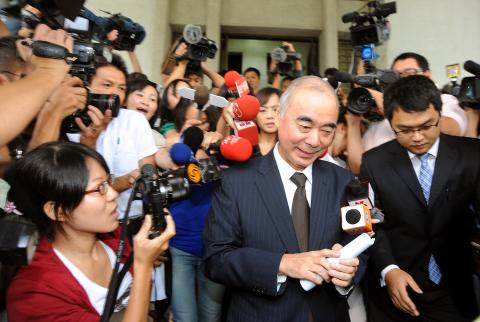The Ministry of Foreign Affairs (MOFA) yesterday recalled Taiwan’s representative to Japan in response to Japan’s decision to nationalize some of the disputed Diaoyutai Islands (釣魚台).
Minister of Foreign Affairs Timothy Yang (楊進添) said at a press conference that the ministry filed a strong protest against Japan’s move and said the ministry has sent a telegram asking envoy Shen Ssu-tsun (沈斯淳) to return home.
The ministry wants him to return to Taiwan “in the shortest possible time” to explain the situation, and he could return home as soon as today, Yang said.

Photo: Liu Hsin-de, Taipei Times
Earlier yesterday, Yang summoned Japan’s representative to Taiwan, Sumio Tarui, to protest the decision made by Japan’s government at a Cabinet meeting yesterday morning to buy three of the Diaoyutai islands from their private owner for ¥2.05 billion (US$26.18 million).
The Japanese government later signed a contract with the owners to cement the deal, according to Japanese media.
Yang said he told Tarui that Japan’s move had not only seriously infringed on Taiwan’s territorial sovereignty, hurt Taiwan-Japan relations and intensified regional tensions, but had also hurt the Taiwanese people’s feelings toward Japan.
He told the Japanese representative that Taiwan would “absolutely not accept and absolutely not recognize” Japan’s actions, and he urged the Japanese government to immediately withdraw its decision or be held responsible for the consequences.
Yang said he also reiterated the government’s stance that the Diaoyutais “are the inherent territory of the Republic of China,” which he said is a historical fact that cannot be changed.
Japan should first admit to the fact that there are territorial disputes surrounding the Diaoyutais to help resolve the issue, Yang said.
After meeting Yang, Tarui was mobbed by reporters as he walked out of the ministry, but he declined to answer questions.
The Diaoyutai Islands, called the Senkakus in Japan, lie about 120 nautical miles (220km) northeast of Taiwan. The island group is claimed by Taiwan, Japan and China.
China acknowledges that the islands fall under the jurisdiction of Taiwan, but stakes its claim to the Diaoyutais on its contention that Taiwan is part of its territory.
Meanwhile, the Chinese Nationalist Party (KMT) legislative cacus yesterday called for lawmakers across party lines to jointly make a visit to the Diaoyutais to assert the nation’s sovereignty over the island chain.
However, the Democratic Progressive Party caucus said that the KMT government, aside from stating that the Republic of China does not recognize the validity of the so-called purchase of the islands by the Japanese government from the private owner, should also make its stance clear and lodge a protest against China over the latter’s claiming of the Diaoyutais.
Additional reporting by Shih Shiao-kuang and Chen Ching-min

PREPAREDNESS: Given the difficulty of importing ammunition during wartime, the Ministry of National Defense said it would prioritize ‘coproduction’ partnerships A newly formed unit of the Marine Corps tasked with land-based security operations has recently replaced its aging, domestically produced rifles with more advanced, US-made M4A1 rifles, a source said yesterday. The unnamed source familiar with the matter said the First Security Battalion of the Marine Corps’ Air Defense and Base Guard Group has replaced its older T65K2 rifles, which have been in service since the late 1980s, with the newly received M4A1s. The source did not say exactly when the upgrade took place or how many M4A1s were issued to the battalion. The confirmation came after Chinese-language media reported

The Taiwanese passport ranked 33rd in a global listing of passports by convenience this month, rising three places from last month’s ranking, but matching its position in January last year. The Henley Passport Index, an international ranking of passports by the number of designations its holder can travel to without a visa, showed that the Taiwan passport enables holders to travel to 139 countries and territories without a visa. Singapore’s passport was ranked the most powerful with visa-free access to 192 destinations out of 227, according to the index published on Tuesday by UK-based migration investment consultancy firm Henley and Partners. Japan’s and

A Ministry of Foreign Affairs official yesterday said that a delegation that visited China for an APEC meeting did not receive any kind of treatment that downgraded Taiwan’s sovereignty. Department of International Organizations Director-General Jonathan Sun (孫儉元) said that he and a group of ministry officials visited Shenzhen, China, to attend the APEC Informal Senior Officials’ Meeting last month. The trip went “smoothly and safely” for all Taiwanese delegates, as the Chinese side arranged the trip in accordance with long-standing practices, Sun said at the ministry’s weekly briefing. The Taiwanese group did not encounter any political suppression, he said. Sun made the remarks when

BROAD AGREEMENT: The two are nearing a trade deal to reduce Taiwan’s tariff to 15% and a commitment for TSMC to build five more fabs, a ‘New York Times’ report said Taiwan and the US have reached a broad consensus on a trade deal, the Executive Yuan’s Office of Trade Negotiations said yesterday, after a report said that Washington is set to reduce Taiwan’s tariff rate to 15 percent. The New York Times on Monday reported that the two nations are nearing a trade deal to reduce Taiwan’s tariff rate to 15 percent and commit Taiwan Semiconductor Manufacturing Co (TSMC, 台積電) to building at least five more facilities in the US. “The agreement, which has been under negotiation for months, is being legally scrubbed and could be announced this month,” the paper said,